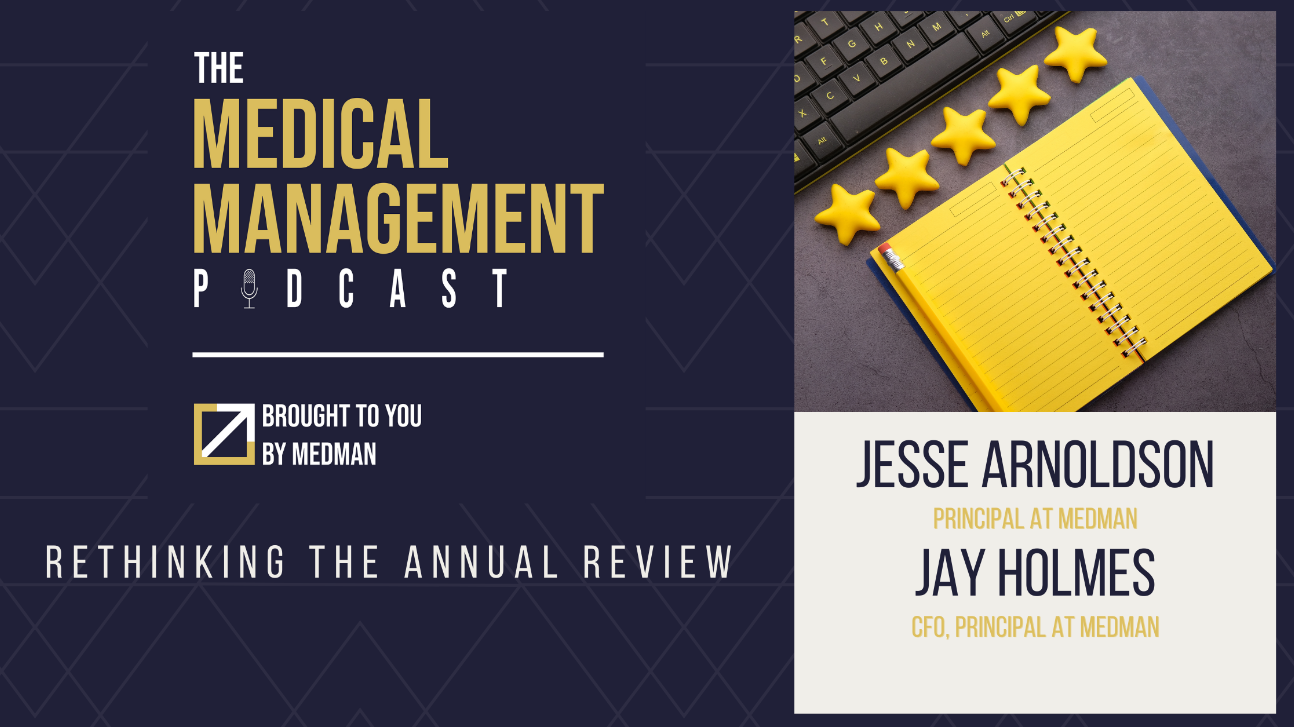
The Medical Management Podcast_Rethinking the annual review: Audio automatically transcribed by Sonix
The Medical Management Podcast_Rethinking the annual review: this mp3 audio file was automatically transcribed by Sonix with the best speech-to-text algorithms. This transcript may contain errors.
Jay Holmes:
Welcome to the Medical Management Podcast. A podcast focused on helping you level up your practice. Through interviews with some of the most successful leaders in the industry, we help uncover resources, tools, and ideas to help you level up your practice. Thanks for tuning in and we hope you enjoy today's program.
Jay Holmes:
Welcome back to the Medical Management Podcast. Thank you so much for tuning in today. Jay and Jesse here to bring you some awesome content. You know, recently, Jesse and I read an absolutely amazing book by Adam Grant called Think Again. And I'm sure another episode will do a book review on that and really dive into it. But before we do that, today, what we want to do is we want to use kind of this urge, this push to think again and really challenge Jesse to rethink annual reviews. Are we stagnant in how we approach or the thought of even having it? Should we rethink that? So, Jesse, welcome to the show and thanks for being on here.
Jesse Arnoldson:
Hey, thanks, Jay. This is a good experiment because this is, I have a lot of hard-set opinions and can sometimes be pretty stuck in my ways. So this is a great place to start experimenting with Grant's theories of thinking again.
Jay Holmes:
Absolutely yes. You know, pretty it might be a little mild as a word to describe the stubbornness that sometimes oozes out of you, but hey, let's start with pretty for now. And let's see how much I can challenge you here.
Jesse Arnoldson:
Let's say passionate instead of stubborn.
Jay Holmes:
Yeah, right.
Jesse Arnoldson:
Yeah.
Jay Holmes:
OK, we'll say passionate.
Jesse Arnoldson:
Let's do this.
Jay Holmes:
Yeah, passionate is certainly a positive twist on it. So. So absolutely. Yeah. So really applying this thinking again concept to something of management, we're going to dive into the annual reviews to talk about that. Tell me about kind of what you're thinking.
Jesse Arnoldson:
You know, up and it's just been my experience, my negative experience with annual reviews that has got me to this point of just seeing no value in them, not doing them and, you know, going out and preaching the gospel of not doing them to others and not having others do it.
Jay Holmes:
So, Jesse, you know, let's start out with or advance this conversation a little bit with why have you been so ardently against doing annual reviews? What are all these things that are pushing you to, to dislike them?
Jesse Arnoldson:
Yeah, you know, I've always seen them as the lazy man's excuse for not giving feedback, timely feedback. You know, I'm just going to collect this stuff. And when I meet up with this person once a year, that's where I'm going to unload all the things that I think that they need to work on. And it's just been this crutch that prevents people from having the courage to step up to somebody when the feedback is, I guess, most needed at the moment. And so it's this lazy man's crutch. And then quite often, you know, I've seen him be tied to pay increases and which brings a whole lot of unintended consequences to it. The person, the employee comes in and is completely focused on whether they're going to get this more likely just a cost of living increase. And that's messing with people's livelihoods. And when we're talking about the receptionist or the medical assistant, every dollar counts like these aren't people who are worried that they're not going to be able to make the full contribution to their IRA this year. These are people who, their cost of insurance just went up, the cost of daycare just went up. And I'm telling them that maybe something that bugged me 10 months ago is going to prevent them from getting their full pay increases. So they're not there thinking about how am I going to improve, I'm ready for feedback, give it to me, because every negative piece of feedback is then used as a justification not to give them, what, you know they're well-earned money. And then on the other side, I see it as just this, whenever somebody comes up to me and says, well, well, then when are we going to talk about pay increases and what do you mean performance can't come into that. I see it again as back to this lazy man's crutch, like if somebody doesn't deserve to get the pay increase, maybe, maybe Angela, the front office manager, doesn't deserve an increase to have it automatically go up, why is that? And more than likely, it's upstream, it's your fault. That's the manager, you didn't address something to help her get to that point or you've hung on to somebody who shouldn't be in the organization and you've hung on for too long. So those are a couple of the reasons. And you can tell by the tone of my voice that I get super annoyed by it and why I so like I've been so stuck in this way of thinking, like no, if that's the way it's going to be, forget it. We're not doing annual reviews.
Jay Holmes:
Hey, I couldn't agree with you more for a lot of things. And we'll probably get into the agreement phase and a little bit here.
Jesse Arnoldson:
Yeah. Yeah.
Jay Holmes:
But before we do, what's the alternative? What have you come to rest on us as an effective alternative?
Jesse Arnoldson:
You know, whether it's effective or not, it's an alternative. I've put in place monthly one-on-ones in clinics where I've been or, you know, with people that report directly to me who we're going to do a monthly one-on-one. I've made it a regular thing to correct simple problems in the moment when they are simple because time is a multiplier for complexity. And if you know, Jay, you say something to me today that annoys me and I hang on to it for three months, even just a month, and I don't just say, hey Jay, that was, that wasn't the greatest thing you just said to me, then when I bring it up in three weeks, it's not about correcting that thing, it's just you've been annoyed by that for three weeks, how small of a thing was that? Like so monthly reviews in the moment, timely corrections. And I have my own pay philosophy of when annual raises go into place and why somebody might get a raise. And I basically put in place an automatic in situations I've been in automatic cost of living adjustment. That just happens. And if there's something above and beyond that, then it's a discussion in the moments, it's not surrounding performance. Because if you're not deserving of that, then that's a discussion of either coaching up or coaching out, kind of. So also been my alternatives up until this point.
Jay Holmes:
Awesome. That's good stuff. Let's take a deep dive into the annual review and a hundred percent agree, I've had a career in public accounting before I got into really specifically health care space and some of the most frustrating situations were all this anticipation of your annual review. In public accounting, just like a lot of professional service firms, it was all about utilization and realization, right, so in the billable hour world, you had how valuable are you by how much you generate the firm versus how much you cost? And there's just absolutely no dialogue between 12 months. And sometimes it's like, hey, this is really important, but we're too busy so annual reviews should happen and there's obviously taxes and stuff, so it's usually around May, June, and then they get pushed out to July or August. And so all of a sudden, this whole thing that you are trying or you're expected to create worth for yourself from is just pushed around like it's not really important. And even when it does happen, you feel you begin to understand that these are actually worthless meetings because it doesn't really matter if it mattered in growth was the purpose, you're absolutely right. Jay. You could have done this better, let me coach you to how to do that. And then the next time you do it, I'm going to tell you if you're following suit or not. And, you know.
Jesse Arnoldson:
That's just not there.
Jay Holmes:
No, it's not there at all. And it's and again, you're often tied to well, since you didn't do all this stuff, this is why we're not going to give you as much as you should. And.
Jesse Arnoldson:
Yes.
Jay Holmes:
There's no better system to unmotivate you than that period.
Jesse Arnoldson:
And think about it from the employer's side, Jay. You have created a situation where you are handing that person a pay raise, in sense, like some, you're going to increase their pay by an amount, not the full amount, but you're increasing their payout of this and alienating them in the exact same moment with the exact same action. So you're giving them more money and dissatisfying them.
Jay Holmes:
Absolutely.
Jesse Arnoldson:
Just like that.
Jay Holmes:
Yup. Here, I'm going to pay you more, I just frustrated you so you're probably gonna work less hard for me. And we're feeling good like hey, yeah, you knock that. We got those annual reviews out of the way.
Jesse Arnoldson:
Yeah. Jay, I used to work at a bank, and to protect their innocence, we'll use a, it rhymes with Hell's Cargo. We won't name them, you know.
Jay Holmes:
Yeah.
Jesse Arnoldson:
But I remember going in for my annual review and I got, it wasn't a dialogue. It was like hey, like a scale of one to five, in these areas you hit a three, hit a four. We're not going to give you a five because there's always room for improvement and like and by the end, I get a 15 cent raise an hour and I just come out of there demoralized, embarrassed that that was what they just offered me. And it's just like, yeah, but that's, these are all reasons that I have gotten to the point where I've hit this point of saying, well, I'm, you know, you're never going to change my mind. You want to talk annual reviews? Sure. Tell me everything but that you like about it. But I'm not going to change my mind. And so I was reading through Grant's book, that was what he pointed out as a red flag. If you ask you, somebody, like, hey, what would it take for you to change your mind on this? And they say nothing. There's nothing that's ever, there's a red flag. This is somebody who has compromised their thinking and cannot improve. And I'm sitting there thinking, gosh, dang it, that's me, annual reviews. That's me with X, Y, Z. OK, maybe this would make a good exercise between me and Jay to rethink it, because it's one I feel so passionately right about that I.
Jay Holmes:
Yeah. And I've done, I've done nothing but stoke that fire. So let me look. Yeah, man, would you.
Jesse Arnoldson:
Let's just end the episode. The lesson learned is that annual reviews are terrible, nobody should rethink it.
Jay Holmes:
So let's change course here in ask what benefit does come out of annual reviews? Is there a place for some sort of mentor or manager and subordinate-ish annual meeting of some sort?
Jesse Arnoldson:
I think there is. And the way that I have almost like put myself on the psychologist's couch in the way where I question myself is, Jesse, what would, what would have to be different in order for you to feel good about the annual review? And it's good that we're doing this because at MedMan we're wanting to get annual reviews back up and going. The decision was made and I need to carry that out. So I've got to get on board somehow. So what did I think through this? I thought through OK, my problems with it are that I feel like the feedback loop is extremely slow. OK, what if you coupled it with these things that you've put in as alternatives, you make sure you have your monthly reviews so you can hit things and keep your finger on the pulse and make sure you're giving people a chance to talk to you regularly. What if you are correcting the small things in the moment? And those things don't have anything to do with the annual interview. You're looking at maybe setting bigger goals for these employees and you're helping them meet them. And then you're also maybe getting feedback from more people than just yourself, because in those monthly one-on-ones, it's just, you know, Jay, my feedback is my feedback. I haven't talked to anybody else about this. Maybe in the annual review, it is a chance to do a 360 look. And if you're an administrator getting some feedback from the physicians, the front desk, the clinical staff, getting a more well-rounded piece of feedback once a year would be helpful. Doing that once a month is too much. So if the annual review is focused on bigger things and other people's feedback and it's coupled with a faster feedback loop through with reviews and stuff like that, great. If you take a payout of the equation and it's just a conversation about performance and feedback and improvement, I can get on board with the can. I can do that. And so I, I see value in other people's feedback and in bigger goals being discussed. And those are the things that I put in place to make myself feel like I'm addressing all the issues I had before. I'm not using my lazy man's crutch of holding feedback until the annual review. I'm not holding or screwing up with some, screwing somebody's livelihood by withholding pay because of negative feedback, like that kind of stuff, I can remove that and feel good about it.
Jay Holmes:
Yeah. I like those things, Jesse. Let's think more, you know, you think about strategic planning, planning an organization, and a lot of that does get set on an annual basis with some fine-tuning throughout the year. You think through that and wonder if it's more about almost the strategic plan for the individual as far as how can we set some annual goals and highlight some things. And that can be this space for that. So it's more strategic where you want to go, both from the organization side saying here's some opportunities that we see that you could fit into. But in the end is, you know, personal development, what do you see as weaknesses and how can I help you get there?
Jesse Arnoldson:
Yeah.
Jay Holmes:
And then it can be a check and to say, look, this is what we did last year. And obviously, it's not just how are you doing in a 12-month cycle, but we're progressing all along with the monthly check-ins, one-on-ones too then having more of a more encompassing 360 along the lines of you're getting feedback on your, what you and the company wanted to grow. And maybe, maybe that would be a good spot.
Jesse Arnoldson:
Maybe, and maybe it would improve those monthly reviews like you just said. If one of my questions in the monthly one-on-ones is, hey, in the last thirty days, what did you do to get closer to that goal you set of graduating from nursing school? You know, maybe that is, the cup they marry in well, possibly.
Jay Holmes:
Absolutely, yup. In the structure then you can spend more time in the annual session, in the annual meeting with this individual to do that.
Jesse Arnoldson:
I like it. I think that this was the point that Grant, Adam Grant was trying to make in the by having such a hard and fast opinion or belief that you never revisit you miss opportunities like these monthly one-on-ones are great, but maybe they could be better by revisiting my thoughts over here on annual reviews. I think that that's what he wanted people to do, or at least I'm hoping that we've done the right thing here.
Jay Holmes:
You know, what I took away from the book is certainly be curious and always strive to, I mean, one of the cool just things a human being can, in my mind, hold on to is the excitement for being wrong because you realize that you've just learned something. And that's this process of saying, I hate annual reviews, everything about them sucks.
Jesse Arnoldson:
Yeah.
Jay Holmes:
And then you're like, well, wait a minute. I mean, there's a couple of aspects that we could make good, like, wow, I've just elevated myself. And in this world of being so fast-paced, like all we have is ourself and right, like that is the one thing that's transferable in wherever you go is improving yourself and improving the way you think. And so.
Jesse Arnoldson:
Amen.
Jay Holmes:
Yup! Amen. And I think it's an awesome place to stop. Jesse, thank you for walking us down this path of rethinking annual reviews. I got a ton from it. Listeners, I hope you did as well. So thanks, Jesse.
Jesse Arnoldson:
Of course.
Jay Holmes:
And a big thank you all again for tuning in. I hope you enjoyed our conversation with Jesse. Before you get distracted, click that subscribe button so you can always stay updated on new content. We really hope you enjoyed our episode today. And thanks again for tuning in.
Jay Holmes:
Thanks for tuning in to the Medical Management Podcast. We hope you enjoyed today's featured guest. For the show notes, transcripts, resources, and everything else MedMan does to help you level up, be sure to visit us at MedMan.com.
Sonix is the world’s most advanced automated transcription, translation, and subtitling platform. Fast, accurate, and affordable.
Automatically convert your mp3 files to text (txt file), Microsoft Word (docx file), and SubRip Subtitle (srt file) in minutes.
Sonix has many features that you'd love including share transcripts, powerful integrations and APIs, automated translation, transcribe multiple languages, and easily transcribe your Zoom meetings. Try Sonix for free today.
Episode Summary
Key Take-Aways
-
Oftentimes, annual reviews are tied to salary increases.
-
Time is a multiplier for complexity.
-
Give feedback whenever you can and at that exact moment.
-
Monthly reviews are good to give feedback.
-
Annual Reviews are good to have a 360 perspective and oversight.
-
Revisit those hard stances towards topics, and you might be missing things that help you grow.








